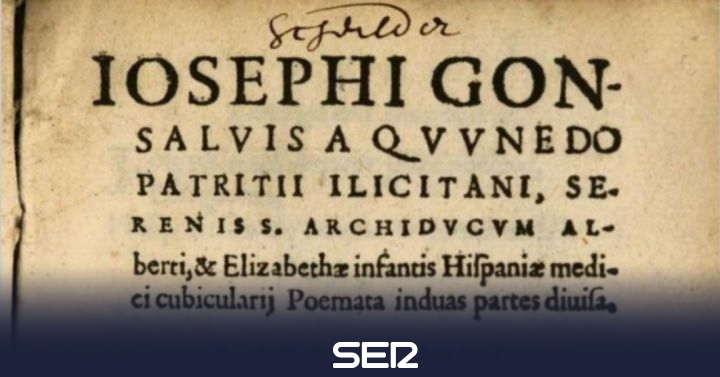Josep Gosalbes de Cunedo, since he settled in Brussels, left a huge poetic work that he wrote in Latin, the cultured language of the time, which he mastered to perfection, which resulted in works of high intellectual level and with a complicated style. Between the years 1595 and 1601 he wrote on different subjects from the nobles of the time to the reform of the Gregorian calendar without forgetting a deep animosity that Protestantism produced.
Joseph Gonsalves from Quunedo. Poems divided into two parts / Universiteitsbibliotheek de Gent
In the rainy Brussels of the time the memory of his land always accompanied him, to which he dedicated several poems: such as the one he wrote on the occasion of the creation of the Bishopric of Orihuela in 1564; or those that he dedicated to the Alicante mountain or Benacantil and what we know today as the Face of the Moor. Nymphs, centaurs and other mythological beings typical of the Renaissance period appeared in these compositions.
His works had a certain success in the Alicante schools until they fell into oblivion. Currently, a team of Latinists from the University of Alicanteworks on the edition and translation of his complete works and thanks to them, they are also discovering other events of his eventful and interesting life.
In an article in the magazine Saó, Professor Antoni Biosca reviews the history of Josep Gosalbes de Cunedo from his birth to his death. And reveals the many hardships that led him to settle in the current Belgian capital, at that time part of the Spanish Empire.
He tells us that in 1588, as a doctor, he joined the crew of the ship San Mateo, which It was part of the so-called Invincible Armada and that it suffered the attacks of the English ships. The boat was wrecked off the coast of Holland. He was saved, although he was taken prisoner, but, along with the wreck, all his emblem books went to the bottom of the sea.
His training saved him from death since thanks to the help of Just Lipsi, the leading humanist of the moment, and other Dutch nobles was able to escape from prison and settle in Brussels where he was welcomed by the Catholic community. Hence his deep aversion to the Dutch Protestants who imprisoned him.
–
–


